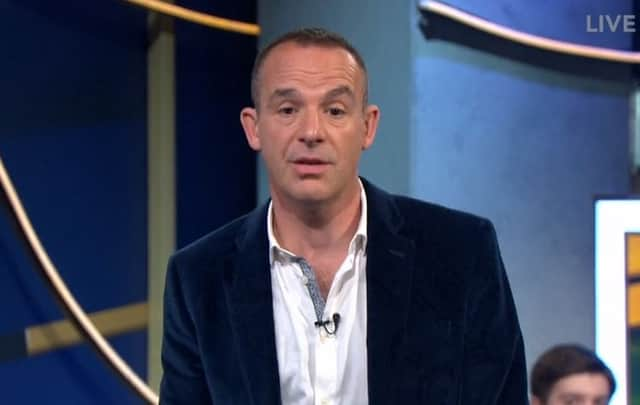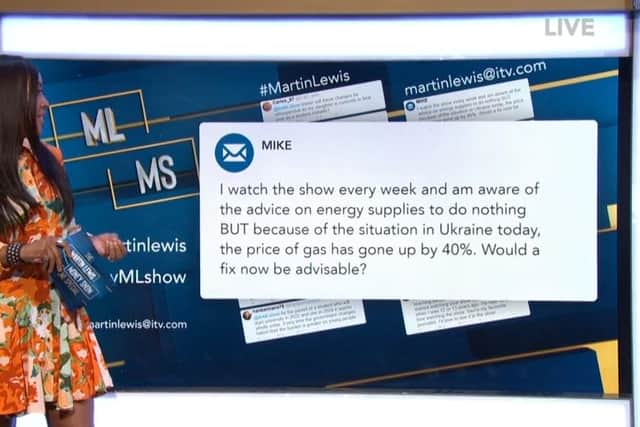Martin Lewis on what Russia-Ukraine conflict could mean for UK energy bills


Martin Lewis has explained what the conflict between Russia and Ukraine could mean for the cost of energy bills for households in the UK.
Russian troops made their way into Ukraine on Thursday (24 February), launching a “full-scale invasion” on the capital of Kyiv, with explosions and missiles causing destruction across the city.
Advertisement
Hide AdAdvertisement
Hide AdThe conflict is expected to have a knock-on economic impact across the world, and it is feared fuel and energy prices in the UK could rocket as a result.
Fuel prices are predicted to rise as the cost is linked to Brent crude, which increased to more than $100 (£74.29) a barrel as Russia moved into Ukraine.
It is the first time that Brent crude has cost more than $100 a barrel since 2014.
Energy costs are also expected to go up as Europe gets around 40% of its natural gas from Russia.
Advertisement
Hide AdAdvertisement
Hide AdWhat has Martin Lewis said?
Martin Lewis addressed concerns about rising energy bills on his ITV Money Show Live on Thursday evening.
The MoneySavingExpert was asked by a worried viewer if it would be best to switch to a fixed energy bill in light of the price of gas rising by 40%.
The viewer, known only as Mike, said: “I watch the show every week and am aware [of] the advice on energy supplies to do nothing BUT because of the situation in Ukraine today, the price of gas has gone up by 40%. Would a fix now be advisable?”


Mr Lewis said it would be “a gamble” to fix as nobody can be sure of how energy prices will fluctuate this year.
Advertisement
Hide AdAdvertisement
Hide AdIn response, Martin said it would be “a gamble” to fix as no one can be sure of how energy prices will fluctuate this year.
He warned that the UK could see another 50% rise in the price cap, which would bring the average energy bill to £3,000 per year in October, but added that it is unclear whether the current spike will continue
He advised that people should only consider fixing if they can find a deal within 60% of the current price cap, but warned it would be a gamble.
He: “This is a horrible situation first of all for people in Ukraine and energy is secondary.”
Advertisement
Hide AdAdvertisement
Hide Ad“Energy prices have spiked horrendously today and if they stayed at that level, then in October we’d see another 50% rise in the price cap bringing the typical bill to £3,000 a year.
“But we don’t know that that spike will continue.
“I’ve said before, if you can find a fix within 60% of the current price cap, it’s probably worth it.
“Back of the envelope, it’s probably now 80% if you want peace of mind.
“Ultimately, until April we’re on a cheap rate, from April we’re on a cheaper rate than any fixes - so it’s a gamble.
“I don’t know and I can’t give you the right answer.”
Advertisement
Hide AdAdvertisement
Hide AdWhen will the price cap go up?
Energy bills will rise by £693 per year for millions of households from the beginning of April.
Ofgem has hiked the price cap on bills to £1,971 or 54% after gas prices soared to unprecedented highs.
For customers with prepayment meters the price cap will go up by £708 to £2,017, the regulator said.
The increase will affect 22 million households across the UK and applies to those who are on their energy supplier’s default tariff.
Advertisement
Hide AdAdvertisement
Hide AdThe price cap had already been set at a record high in October before the worst of the gas price spike had been seen in the market.
It is based on the price of wholesale energy and supplier costs which have rocketed in recent months, meaning consumers are now facing huge gas and electricity bills.
Wholesale gas prices have increased by 250% since January and rose by 70% in August alone.
The increase was fuelled by a cold winter across Europe last year, meaning gas was being used up more quickly putting pressure on global supplies.